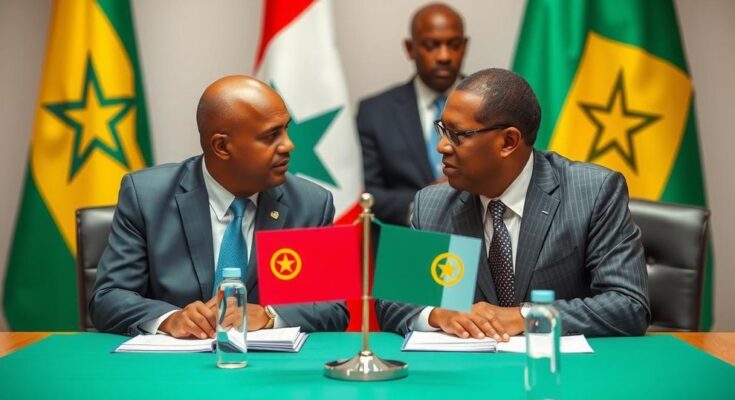Somalia and Ethiopia have restored full diplomatic relations, concluding a year-long rift that threatened stability in the Horn of Africa. This decision was made during President Hassan Sheikh Mohamud’s visit to Ethiopia, following a Turkey-mediated peace agreement. Discussions on trade and security cooperation were held, although uncertainties regarding Ethiopia’s agreements with Somaliland and regional tensions persist.
On January 11, Somalia and Ethiopia announced the restoration of full diplomatic relations, ending a year-long rift that had contributed to instability in the Horn of Africa. This agreement was reached during Somali President Hassan Sheikh Mohamud’s visit to Ethiopia, where he and Ethiopian Prime Minister Abiy Ahmed committed to enhancing bilateral relations through a joint statement.
The diplomatic rift stemmed from Ethiopia’s controversial agreement with Somaliland, Somalia’s breakaway region, which allegedly involved recognizing Somaliland’s independence in return for access to a Red Sea port and a military base. In response, Somalia expelled the Ethiopian ambassador in April and severed diplomatic ties. A subsequent peace deal mediated by Turkey last month facilitated this reconciliation, with both leaders emphasizing their commitment to friendship and solidarity.
During the visit, discussions also included plans to strengthen cooperation in trade and security, particularly in addressing extremist groups that pose regional threats. However, uncertainties linger regarding Ethiopia’s access to the sea, a point raised by Turkish President Recep Tayyip Erdogan, as well as the future of Ethiopia’s agreement with Somaliland.
Tensions in the region persist, highlighted by a prior meeting in Cairo where Somalia’s Foreign Minister and his counterparts from Egypt and Eritrea discussed the security of the Red Sea. Egyptian Foreign Minister Badr Abdelatty underscored the critical importance of sovereignty over the Red Sea, declaring that it is essential for coastal nations to control its security and that outside military presence is unacceptable. Furthermore, Egypt, Eritrea, and Somalia have formed a regional alliance aimed at countering Ethiopia’s influence, with Egyptian troops deploying to the African Union Support and Stabilisation Mission in Somalia (AUSSOM).
The diplomatic relationships in the Horn of Africa have been historically complex, with Somalia and Ethiopia sharing a contentious history marked by territorial disputes and regional politics. This latest rift, driven by Ethiopia’s controversial dealings with the breakaway region of Somaliland, escalated into a significant diplomatic conflict. The situation reflects the intricate interplay of regional power dynamics, economic interests, and security concerns among neighboring countries, impacting stability in the Horn of Africa.
In conclusion, the restoration of diplomatic relations between Somalia and Ethiopia marks a significant step toward regional stability in the Horn of Africa. While both nations have pledged to enhance cooperation in trade and security, challenges remain regarding Ethiopia’s agreements with Somaliland and overall regional tensions. The long-term effects of this reconciliation will depend on the successful resolution of these pivotal issues, which are critical to maintaining peace in the region.
Original Source: www.firstpost.com




